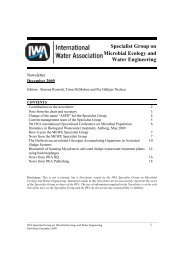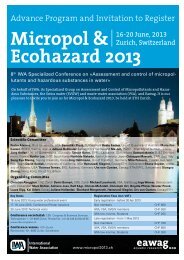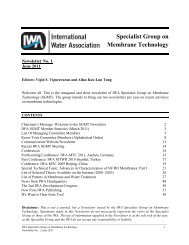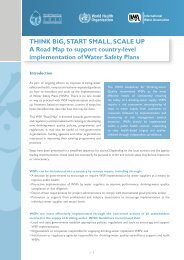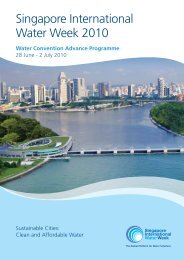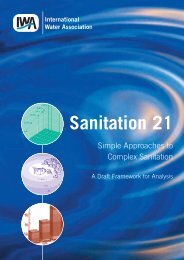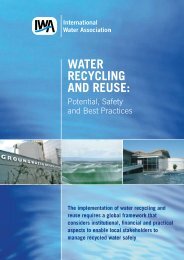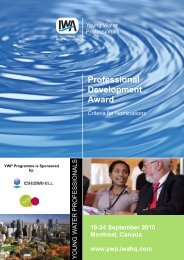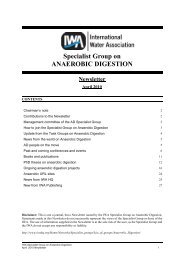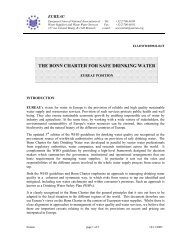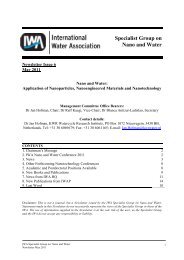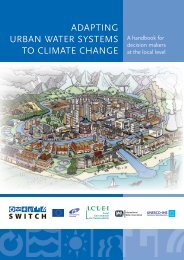Annual Review 2011 - IWA
Annual Review 2011 - IWA
Annual Review 2011 - IWA
You also want an ePaper? Increase the reach of your titles
YUMPU automatically turns print PDFs into web optimized ePapers that Google loves.
54<br />
<strong>IWA</strong> Development Solutions<br />
Award - Research<br />
In recognition of Sandec’s applied research and<br />
high quality science that provides leadership and<br />
partnership for the academic community working<br />
in low and middle income countries. Presented to<br />
Christian Zurbrugg, Director, Sandec<br />
Sandec started life as a WHO reference centre back in<br />
the late 1960s and was then converted to a research<br />
department of Eawag: the Swiss Federal Institute of<br />
Aquatic Science and Technology, in the early 1970s. One of<br />
Sandec’s strengths therefore is its long-term commitment,<br />
which has been made possible by continuous Eawag<br />
directorate support.<br />
Sandec benefits from the multidisciplinary expertise of Eawag<br />
colleagues and their interest in issues in the developing<br />
world, and its research and capacity development focus is on<br />
water treatment, sanitation planning, excreta and wastewater<br />
management as well as solid waste management for low and<br />
middle income countries.<br />
For instance, in drinking water Sandec’s focus for many<br />
years has been on water quality issues – specifically on<br />
household water treatment. Examples such as Solar Water<br />
Disinfection (SODIS) have been recognised as one of the<br />
standard approaches for household water treatment for an<br />
estimated two million or more users worldwide. More recent<br />
research focuses on fluoride removal filters, arsenic removal<br />
and gravity-driven membrane filters, with ongoing projects<br />
in Kenya, Ethiopia and Bangladesh.<br />
On sanitation planning, in collaboration with experts around<br />
the globe, Sandec has developed community-led sanitation<br />
planning approaches such as the HCES (household-centred<br />
environmental sanitation planning) approach, which is used<br />
as a basis by many planning and development agencies.<br />
Christian Zurbrugg, on behalf of Sandec, receives the<br />
<strong>IWA</strong> DS Award for Research from Glen Daigger at <strong>IWA</strong><br />
Development Congress, KL, November <strong>2011</strong><br />
The organisation’s experience with field trials in sanitation<br />
planning led it to embark on developing decision support<br />
tools for choosing sanitation options, one result being<br />
the Compendium of sanitation systems and technologies.<br />
Sandec is currently working on improving the toolbox for<br />
sanitation planning and decision support.<br />
All of Sandec’s research is strongly concentrated on<br />
application and finding practical solutions, so the company<br />
has a keen focus on developing research products that<br />
serve practice and policymakers. As typical research<br />
papers in academic journals often do not reach that target<br />
audience, the organisation puts a great deal of effort into<br />
developing manuals, guidelines and practical tools and<br />
methods for those who are responsible for decision-making<br />
and implementation.<br />
Sandec believes that one organisation alone cannot<br />
solve the water sanitation challenges of low and middle<br />
income countries – it requires partnerships between local<br />
governments, private sector, practitioners, researchers and<br />
development agencies. ‘<strong>IWA</strong> provides an ideal platform to<br />
build and establish such partnerships,’ Mr Zurbrugg says.<br />
Project Innovation Award –<br />
Development<br />
In <strong>2011</strong>, following a reflection on the geographical<br />
scope of the Project Innovation Awards, <strong>IWA</strong><br />
established a new Awards programme that caters<br />
specifically for low and middle income countries.<br />
Named the <strong>IWA</strong> Project Innovation Awards –<br />
Development, this new award aims to ‘recognise<br />
and celebrate excellence and innovation in water<br />
and sanitation projects in developing countries’.<br />
Through this, <strong>IWA</strong> hopes to foster innovation in<br />
service delivery in developing countries, embed<br />
innovative practices amongst practitioners, and<br />
provide recognition for new solutions to existing<br />
challenges in support of international efforts to<br />
achieve the Millennium Development Goals.<br />
A total of 35 projects were submitted for this inaugural<br />
PIA-Development cycle, demonstrating practical and<br />
integrated development. Projects paid particular attention<br />
to:<br />
• Social, technical, financial, economic, environmental<br />
and institutional issues;<br />
• A focus on towns, cities and peri-urban/urban environments;<br />
• Demonstrating sustainability on the basis of users’<br />
willingness to pay recurrent costs, local operation and<br />
maintenance and locally-available replacement parts, with<br />
capital costs proportionate to local incomes.<br />
The winning projects were recognised at an award reception<br />
on 23 November <strong>2011</strong> during the 2nd <strong>IWA</strong> Development<br />
Congress & Exhibition in Kuala Lumpur, Malaysia.<br />
The winners for the <strong>2011</strong><br />
PIA Development are:<br />
Drinking Water category<br />
Applied Research<br />
Winner:<br />
Presented to the National Environmental Engineering<br />
Research Institute (NEERI), India, for the ZAR multipollutant<br />
water treatment unit.<br />
Honour Award:<br />
Presented to the National Environmental Engineering<br />
Research Institute (NEERI), India, for solar energy based<br />
electrolytic defluoridation.<br />
Hardware<br />
Winner:<br />
Presented to the Emfuleni Local Municipality for the<br />
Sebokeng and Evaton advanced pressure management<br />
project, South Africa.<br />
Honour Award:<br />
Presented to GHD Engineering Consultants for the Maji Safi<br />
Afya Bora Ifakara (MSABI) sustainable privatisation business<br />
models for the safe delivery of water, Tanzania.<br />
Software<br />
Winner:<br />
Presented to Maynilad Water Services for the Samahang<br />
Tubig Maynilad programme; the Maynilad community-based<br />
water management programme in the West Zone of Metro<br />
Manila, The Philippines.<br />
Honour Award:<br />
Presented to the Manila Water Company for the ‘Tubig Para<br />
Sa Barangay’ programme, providing clean and affordable<br />
water to poor communities using a sustainable model and<br />
community participatory approach, The Philippines.<br />
55



